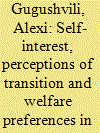|
|
|
Sort Order |
|
|
|
Items / Page
|
|
|
|
|
|
|
| Srl | Item |
| 1 |
ID:
150019


|
|
|
|
|
| Summary/Abstract |
Adequately accounting for interactions between Low Carbon Technologies (LCTs) at the building level and the overarching energy system means capturing the granularity associated with decentralised heat and power supply in residential buildings. The approach presented here adds novelty in terms of a realistic socioeconomic differentiation by employing dwelling/household archetypes (DHAs) and neighbourhood clusters at the Output Area (OA) level. These archetypes are combined with a mixed integer linear program (MILP) to generate optimum (minimum cost) technology configurations and operation schedules. Even in the baseline case, without any LCT penetration, a substantial deviation from the standard load profile (SLP) is encountered, suggesting that for some neighbourhoods this profile is not appropriate. With the application of LCTs, including heat pumps, micro-CHP and photovoltaic (PV), this effect is much stronger, including more negative residual load, more variability, and higher ramps with increased LCT penetration, and crucially different between neighbourhood clusters. The main policy implication of the study is the importance of understanding electrical load profiles at the neighbourhood level, because of the consequences they have for investment in the overarching energy system, including transmission and distribution infrastructure, and centralised generation plant. Further work should focus on attaining a superior socioeconomic differentiation between households.
|
|
|
|
|
|
|
|
|
|
|
|
|
|
|
|
| 2 |
ID:
086955


|
|
|
|
|
| Publication |
2009.
|
| Summary/Abstract |
The accepted wisdom is that the patent system originated in Europe and that China did not have such an indigenous system throughout its history. The reasons for the lack of such a system are not often explored among legal scholars although, for decades, historians have debated on a related matter of why the Industrial Revolution did not start in China after its centuries' lead in science and technology. It appears that legal scholars generally accept that Confucian philosophy precluded an intellectual property system in China including a patent system. The article aims to dispute this belief by showing that socioeconomic and geographical factors underscored the main reasons for the lack of a patent system in ancient China.
|
|
|
|
|
|
|
|
|
|
|
|
|
|
|
|
| 3 |
ID:
139275


|
|
|
|
|
| Summary/Abstract |
This article studies public welfare preferences in Armenia, Azerbaijan, Belarus, Georgia, Moldova and Ukraine. Generalised ordered logistic regression models and predicted probabilities are employed to analyse comparable attitudinal survey data. The results vary considerably among the countries, but age is the most important covariate of welfare preferences, followed by individuals' socio-economic characteristics. The findings also indicate that popular perceptions of transition, notably in Ukraine and Moldova, are most strongly linked to preferences concerning the state's involvement in reducing the gap between the rich and the poor rather than to preferences regarding the main welfare state programmes such as pensions and healthcare.
|
|
|
|
|
|
|
|
|
|
|
|
|
|
|
|
| 4 |
ID:
132407


|
|
|
|
|
| Publication |
2014.
|
| Summary/Abstract |
This paper conducts an analysis of the socioeconomic determinants of Vietnam's cross-provincial variations in natural disaster vulnerability. The purpose is twofold: (i) to capture disaggregated vulnerability variations normally obscured by national statistics, thereby providing more nuanced insights into Vietnam's vulnerability to natural disasters; and (ii) to take advantage of the fact that the overall political system and key institutional structures to a large extent are constant across Vietnam's provinces, which makes the analysis a novel addition to the many disaster studies based on cross-national variations. The paper's analysis indicates that much of Vietnam's cross-provincial variations in natural disaster fatalities and economic costs can be explained by differences in key socioeconomic factors. High provincial rates of inequality, poverty and infant mortality, for instance, appear to drive up natural disaster fatalities. Local adaptation efforts should focus as much on these broader socioeconomic dimensions as they focus on the geophysical susceptibility to natural hazards of individual areas.
|
|
|
|
|
|
|
|
|
|
|
|
|
|
|
|
|
|
|
|
|